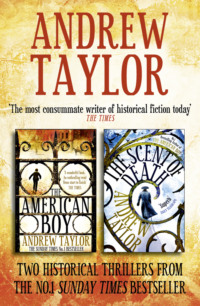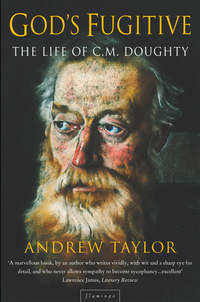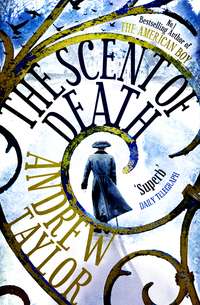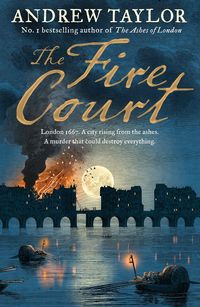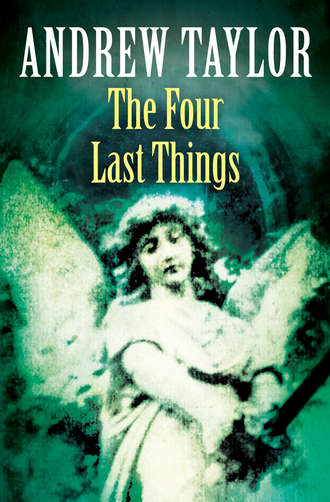
Полная версия
The Four Last Things
Michael was there too, talking angrily into the phone, slashing his free hand against his leg to emphasize what he was saying. He stared in Sally’s direction but seemed not to register her presence: he was looking past her at something unimaginable.
2
‘I am naturally bashful; nor hath conversation, age, or travel, been able to effront or enharden me …’
Religio Medici, I, 40
Eddie called her Angel and so had the children. He knew the name pleased her but not why. Lucy Appleyard refused to call Angel anything at all. In that, as in so much else, Lucy was different.
Lucy Philippa Appleyard was unlike the others even in the way Angel chose her. It was only afterwards, of course, that Eddie began to suspect that Angel had a particular reason for wanting Lucy. Yet again he had been manipulated. The questions were: how much, how far back did it go – and why?
At the time everything seemed to happen by chance. Eddie often bought the Evening Standard, though he did not always read it. (Angel rarely read newspapers, partly because she had little interest in news for its own sake, and partly because they made her hands dirty.) Frank Howell’s feature on St George’s, Kensal Vale, appeared on a Friday. Angel chanced – if that was the appropriate word – to see it the following Tuesday. They had eaten their supper and Eddie was clearing up. Angel wanted to clean her shoes, a job which like anything to do with her appearance was too important to be delegated to Eddie.
She spread the newspaper over the kitchen table and fetched the shoes and the cleaning materials. There were two pairs of court shoes, one navy and the other black, and a pair of tan leather sandals. She smeared the first shoe with polish. Then she stopped. Eddie, always aware of her movements, watched as she pushed the shoes off the newspaper and sat down at the table. He put the cutlery away, a manoeuvre which allowed him to glance at the paper. He glimpsed a photograph of a fair-haired man in dog collar and denim jacket, holding a black baby in the crook of his left arm.
‘Wouldn’t like to meet him on a dark night,’ Eddie said. ‘Looks like a ferret.’ Imagine having him running up your trousers, he thought; but he did not say this aloud for fear of offending Angel.
She looked up. ‘A curate and a policeman.’
‘He’s a policeman, too?’
‘Not him. There’s a woman deacon in the parish. And she’s married to a policeman.’
Angel bent her shining head over the newspaper. Eddie pottered about the kitchen, wiping the cooker and the work surfaces. Angel’s stillness made him uneasy.
To break the silence, he said, ‘They’re not really like vicars any more, are they? I mean – that jacket. It’s pathetic.’
Angel stared at him. ‘It says they have a little girl.’
His attention sharpened. ‘The ferret?’
‘Not him. The curate and the policeman. Look, there’s a picture of the woman.’
Her name was Sally Appleyard, and she had short dark hair and a thin face with large eyes.
‘These women priests. If you ask me, it’s not natural.’ Eddie hesitated. ‘If Jesus had wanted women to be priests, he’d have chosen women apostles. Well, wouldn’t he? It makes sense.’
‘Do you think she’s pretty?’
‘No.’ He frowned, wanting to find words which Angel might want to hear. ‘She looks drab, doesn’t she? Mousy.’
‘You’re right. She’s let herself go, too. One of those people who just won’t make the effort.’
‘The little girl. How old is she? Does it say?’
‘Four. Her name’s Lucy.’
Angel went back to her shoes. Later that evening, Eddie heard her moving around the basement as he watched television in the sitting room above. It was over a year since he had been down there. The memories made him feel restless. He returned to the kitchen to make some tea. While he was there he reread the article about St George’s, Kensal Vale. He was not surprised when Angel announced her decision the following morning over breakfast.
‘Won’t it be dangerous?’ Eddie stabbed his spoon at the photograph of Sally Appleyard. ‘If her husband’s in the CID, they’ll pull out all the stops.’
‘It won’t be more dangerous if we plan it carefully. You’ve never really understood that, have you? That’s why you came a cropper before you met me. A plan’s like a clock. If it’s properly made it has to work. All you should need to do is wind it up and off it goes. Tick tock, tick tock.’
‘Are we all right for money?’
She smiled, a teacher rewarding an apt pupil. ‘I shall have to do a certain amount extra to build up the contingency fund. But it’s important not to break the routine in any way. I think I might warn Mrs Hawley-Minton that I may have some time off around Christmas.’
During the next two months, from mid-September to mid-November, Angel worked on average four days a week. Sometimes these included evenings and nights. Mrs Hawley-Minton’s agency was small and expensive. Word of mouth was all the advertising it needed. Most of the clients were either foreign business people or expatriates paying brief visits home. They were prepared to pay good money for reliable and fully qualified freelance nannies with excellent references and the knack of controlling spoiled children. The tips were good, in some cases extravagantly generous.
‘It’s a sort of blood money,’ Angel explained to Eddie. ‘It’s not that the parents feel grateful. They feel guilty. That’s because they’re not doing their duty – they’re leaving their children to be brought up by strangers. It’s not right, is it? Money can’t buy love.’
They were very busy. On the agency days, Angel took the tube down from Belsize Park and made her way to Westminster, Belgravia, Knightsbridge and Kensington. She looked very smart in her navy-blue outfit, her blonde hair tied back, the hem of her skirt swinging just below the knee. Mrs Hawley-Minton’s girls did not have a uniform – after all, they were ladies, not servants – but they were encouraged to conform to a discreetly professional house style. Meanwhile, Eddie saw to the cooking, the cleaning and most of the shopping.
In their spare time they made their preparations. For one thing, Angel insisted on repainting the basement, a refinement which Eddie thought unnecessary.
‘What’s the point? We only did it eighteen months ago.’
‘I want everything to be nice and fresh.’
They shared the outside research. Angel liked to say there was no such thing as useless knowledge. If you gathered all the information that could possibly be relevant, and tried to predict every contingency, then your plan could not fail. Working separately, they quartered the broad crescent of north London between Kentish Town in the east and Willesden Junction in the west. They went in the van, on foot and by public transport. Afterwards Angel would set little tests.
‘Suppose you’re travelling from Kensal Vale: it’s rush hour, and there are roadworks on Kilburn High Road, and you want to cut down to Maida Vale: what’s your best route?’
The riskier part of the research involved the surveillance of Lucy and her parents. Angel insisted that they be even more cautious than they had been on other occasions because of Michael Appleyard’s job. It was easier once they had worked out the geography of the Appleyards’ routine. Like the majority of Londoners, the Appleyards spent most of their lives at a handful of locations or travelling to and from them; their city was really an invisible village.
Angel spread out the map on the kitchen table. ‘Four main possibilities. St George’s, the flat in Hercules Road, the child minder’s house, Kensal Vale library.’
‘What about shops?’ Eddie put in. ‘She and her mother often go down West End Lane. And they’ve driven up to Brent Cross at least twice since we started.’
Angel shook her head. ‘I don’t like it. Too many video cameras around, especially at Brent Cross. Remember that boy Jamie. Jamie Bulger.’
That year a dank autumn slid imperceptibly into a winter characterized by cutting winds and relentless rain; pedestrians wrapped up warmly and hurried half-disguised along the pavements. On research trips Angel usually wore her long, hooded raincoat, often with the black wig and glasses.
‘It makes you look like a monk,’ Eddie said with a chuckle as she checked her appearance in the hall mirror one evening. ‘Or rather, a nun.’
She slapped him. ‘Don’t ever say that again, Eddie.’
He rubbed his tingling cheek and apologized, desperate as always for her forgiveness. However hard he tried, he sometimes managed to upset her. He hated himself for his clumsiness. It made everything so uncomfortable when Angel was upset.
Eddie worried about Angel going out alone in the evening. These days no one was safe on the streets of London, and beautiful women were more vulnerable than anyone. One night in October she returned home towards midnight with a torn coat, her colour high and the glasses missing. She told Eddie that a drunk had pawed her in Quex Road.
‘It was disgusting. It’s made me feel physically sick.’
‘But what happened?’ Eddie drew her towards the sitting room. For once the roles were reversed. He felt fiercely protective towards her. ‘How did you get away?’
‘Oh, that wasn’t a problem.’ She drew her right hand out of her pocket. Silver flashed before his eyes.
‘What is it?’ He looked more closely and frowned. ‘A scalpel?’
‘I cut open his hand and then his face. Then I ran. If people behave like animals, they have to be treated like animals.’
On another occasion they went together to St George’s and stared at the grubby red brick church with its sturdy spire and rain-washed slate roofs. Angel tried the door but it was locked. Eddie was surprised how angry this made her.
‘It’s terrible. They never used to lock churches when I was young. Not in the daytime.’
‘Did you go to church?’ Eddie asked, suddenly curious. ‘We didn’t.’
‘Didn’t you?’ Angel raised her eyebrows. ‘Shall we go?’
By the middle of November, Angel had decided that it would be best to take Lucy while she was in the care of the child minder. According to the Voters’ List, her name was Carla Vaughan. Angel summed up the woman with three adjectives: fat and vulgar and black.
‘You think it’ll be easier if we take her from there?’ Eddie asked.
‘Of course. The Vaughan woman takes far too many children. There’s no way she can keep track of them all the time.’
‘She was giving them sweets when they were at the library. I bet she doesn’t make them clean their teeth afterwards. And they were making a dreadful racket in there. She was almost encouraging it.’
‘She’s a disgrace,’ Angel said. ‘When she’s at home with them, she probably sits them in front of the television and feeds them chocolate to keep them quiet. I’m sure she hasn’t any professional qualifications.’
‘Lucy’ll be better off with us,’ Eddie said.
‘There’s no question of that. She’s just not a fit person to have charge of children.’
By the afternoon of Friday the twenty-ninth of November their preparations were almost complete. That was when Eddie acted on the spur of the moment; as so often, it seemed to him that he had no choice in the matter. The sense of his own helplessness outweighed even his fear of what Angel might say and do when she discovered what had happened.
Circumstances played into his hands – forced him to act. Rain, a cold dense blanket like animated fog, had been falling from a dark sky for most of the afternoon, persuading people to stay inside if they had any choice in the matter. At Angel’s suggestion, Eddie set out to explore the geography of Carla Vaughan’s neighbourhood.
The prospect of plodding through a dreary network of back streets between Kilburn and Kensal Vale would have been boring if it had not scared him so much. In his imagination, this part of London was populated almost exclusively by drug addicts, dark-skinned muggers, gangs of uncontrollable teenagers and drunken Irishmen with violent Republican sympathies.
Shivering at his own daring, he parked the van in the forecourt of a pub called the Rose of Connemara. With the help of a map he navigated his way through the streets around Carla’s house. Much of the housing consisted of late-Victorian terraces, with windows on or near the pavement. Lights were on in many of the windows. He glimpsed snug interiors, a series of vignettes illustrating lives which had nothing to do with him: a woman ironing, children watching television, an old man asleep in an armchair, a black couple dancing together, pelvis to pelvis, oblivious of spectators. He met few other pedestrians and none of them tried to mug him.
The way he found Lucy – no, the way Lucy came to him – seemed in retrospect little short of miraculous; if he believed in God he could have taken it as evidence of a divine providence hovering benignly over his affairs. He had been exploring an alley which ran between the back gardens of two terraces. One of the houses on his right was Carla’s, and he had carefully counted the gardens in order to establish which belonged to her. He saw no one, though at one point an Alsatian flung itself snarling against a gate as he passed.
He identified Carla’s house without trouble. The windows were of the same type as those at the front – UPVC frames with the glass patterned to imitate diamond panes; wholly out of period with the house but typical of the area and the sort of person who lived in it.
The little miracle, his present from Father Christmas, was waiting for him, her dark hair gleaming with pearl-like drops of rainwater.
‘It was Lucy’s fault,’ Eddie told Angel later. ‘She’s such a tease. She was asking for it.’
Angel was furious when they reached Rosington Road. She didn’t say much, not with Lucy there, but she suggested in an icy voice that Eddie might like to go to his room and wait there until she called him. Angel took Lucy to the basement. By that time Lucy had started to cry, which increased Eddie’s misery. It made him so sad when children were unhappy.
‘I’m too soft for my own good,’ he murmured to himself. ‘That’s my trouble.’
Eddie sat on his bed, hands clasped over his plump stomach, as though trying to restrain the sour ache inside from bursting out. On the wall opposite him was a picture, a brightly coloured reproduction in a yellowing plastic frame. It showed a small girl in a frothy pink dress; she had a pink bow in her dark hair, a mouth like a puckered cherry and huge eyes fringed with dark lashes. The picture had been a Christmas present to Eddie’s mother in 1969.
The girl, now seen through water, blurred and buckled. Oh God. Why don’t you help me? Stop this. There was no God, Eddie knew: and therefore no chance of help. He thought briefly of Lucy’s parents, the policeman and the deacon. Let the woman’s God console them. That was his job. In any case, Eddie was not responsible for the Appleyards’ pain. It had been Angel’s decision to take Lucy. So it was her fault, really, her fault and Lucy’s. Eddie had been no more than the agent, the dupe, the victim.
Time passed. Eddie would have liked to go down to the kitchen and make himself a drink. Better not – there was no point in upsetting Angel any further. He heard cars passing up and down Rosington Road and snatches of conversation from the pavement. The house itself was silent. The basement was soundproofed and Angel had not switched on the intercom.
‘Lucy,’ he said softly. ‘Lucy Philippa Appleyard.’
Eddie stared at the picture of the girl and stroked his soft little beard. He had been five that Christmas. Had the artist been lucky enough to have a real model, someone like Lucy? He remembered how his mother slowly unwrapped the picture and stared at it; how she picked a shred of tobacco from her lips and flicked it into the ashtray; how she stared across the hearthrug at his father, who had given her the picture. What he could not remember was whether she had spoken her verdict aloud, or whether he had merely imagined it.
‘Very nice, Stanley. If you like that sort of thing.’
What had Eddie’s father liked? If you asked different people you received different answers: for example, making dolls’ houses, taking artistic photographs and helping others less fortunate than himself. All these answers were true.
Stanley Grace spent most of his life working at the head office of Paladin Assurance. The company no longer existed – it had been gobbled up by a larger rival in one of the hostile takeovers of the late 1980s. In the days of its independence, the Paladin had been a womb-like organization which catered for all aspects of its employees’ lives. Eddie remembered Paladin holidays, Paladin Christmas cards, Paladin pencils, Paladin competitions and the Paladin Annual Ball. Stanley Grace bought 29 Rosington Road in 1961 with a mortgage arranged through the Paladin, and promptly insured the house, its contents, himself and his wife with Paladin insurance policies.
Eddie never discovered what his father actually did at Paladin. The relationship between his parents was equally mysterious. ‘Relationship’ was in fact a misleading word since it implied give and take, a movement from one to the other, a way of being together. Stanley and Thelma did not live together: they coexisted in the wary manner of animals from different species obliged by circumstances beyond their control to use the same watering hole.
Eddie remembered asking his mother when he was very young whether he was human.
‘Of course you are.’
‘And are you human, too?’
‘Yes.’
‘And Daddy?’
‘Oh, for heaven’s sake. Of course he is. I wish you’d stop pestering me.’
Stanley was a large, lumbering man built like a bear. He towered over his wife. Thelma was skinny and small, less than five feet high, and she moved like a startled bird. She had a long and cylindrical skull to which features seemed to have been added as an afterthought. Her clothes were usually drab and a size or so too large for her; her cardigans and skirts were dappled with smudges of cigarette ash. (Until the last year of her life she smoked as heavily as her husband.) When, later in life, Eddie came across references to people wearing sackcloth, he thought of his mother.
She was nearly forty when Eddie was born, and Stanley was forty-seven. They seemed more like grandparents than parents. The boundaries of their lives were precisely defined and jealously guarded. Thelma had her headquarters in the kitchen, and her writ ran in the sitting room, the dining room and all the rooms upstairs. The basement was Stanley’s alone; he installed a five-lever lock on the door from the hall because, as he would say jocularly, if he left the basement door unlocked, the Little Woman would start dusting and tidying, and he wouldn’t be able to find anything. Stanley also had a controlling interest in the tiny paved area which separated the front of the house from the pavement, and in the wilderness at the back.
Gardening was not among Stanley’s hobbies and in his lifetime the back garden remained a rank and overgrown place, particularly at the far end, where an accidental plantation of elder, ash and buddleia had seeded itself many years before. Over the tops of the trees could be seen the upper storeys of a block of council flats, which Thelma said lowered the tone of the neighbourhood. At night the lighted windows of the flats reminded Eddie of the superstructure of a liner. He liked to imagine it forging its way across a dark ocean while the passengers ate, drank and danced.
As a child, Eddie had associated the tangle of trees with the sound of distant trains, changing in direction as the wind veered from Gospel Oak and Primrose Hill to Kentish Town and Camden Road. He heard their strange, half-animal noises more clearly than in the house or even in the street – the throbbing of metal on metal, the rush of air and sometimes a scream. When he was very young indeed, he half-convinced himself that the noises were made not by trains, but by dinosaurs who lay in wait for him among the trees or in the patch of wasteland on the other side of the fence.
Though Stanley had no time for gardening, he liked to stand outside on a summer evening while he smoked a cigarette. His head cocked, as if listening carefully to the rumble of the trains, he would gaze in the direction of the trees and sometimes his pale, sad face would look almost happy.
In those days, the late 1960s and early 1970s, Rosington Road was full of children. Most of the houses had been occupied by families, whereas nowadays many of them had been cut up into flats for single people and couples. There had been fewer cars, children played in the street as well as in the gardens, and everyone had known one another. Some of the houses had belonged to the same families since the street was built in the 1890s.
According to Thelma, the house had been Stanley’s choice. She would have preferred somewhere more modern in a nice leafy suburb with no blacks or council housing. But her husband felt that his leisure was too important to be frittered away on unnecessary travel and wanted to live closer to the City and the head office of the Paladin. The house was semi-detached, built of smoke-stained London brick, two storeys above a basement. The ground sloped down at the back, so the rear elevation was higher than the front. The other older houses in the road were also semi-detached, though the gaps between each pair and its neighbours were tiny. During the war the area had suffered from bomb damage. One bomb had fallen on the far end of the road and afterwards the council had cleared the ruins to make way for garages and an access road for blocks of flats, newly built homes for heroes, between Rosington Road and the railway line.
Adult visitors rarely came to the house. ‘I can’t abide having people here,’ said Thelma. ‘They make too much mess.’
When his mother went out, she would hurry along Rosington Road with her head averted from the windows, and her eyes trained on the kerb. When Eddie was young she would drag him along in her wake, her fingers digging into his arm. ‘We must get on,’ she would say with an edge of panic to her voice when he complained of a stitch. ‘There’s so much to do.’
Stanley was very different. As he was leaving home he picked up another persona along with his umbrella, hat and briefcase. He became sociable, even gregarious, as he strolled along Rosington Road on his way to the station. Given a choice, he walked slowly, his chest thrust out, his feet at right angles to each other, which gave his gait more than a suspicion of a waddle. As he progressed down the street, his white, round face turned from side to side, searching for people – for anyone, neighbour or stranger, adult or child.
“Morning. Lovely day. Looks like it’s going to last.’ He would beam even if it was raining, when his opening gambit was usually, ‘Well, at least this weather will be good for the garden.’
At the office Stanley had a reputation for philanthropy. For many years he was secretary to the Paladin Dependants Committee, an organization which provided small luxuries for the widows and children of former employees of the company. It was he who organized the annual outing to Clacton-on-Sea, and the week’s camping holiday, also once a year, which involved him taking a party of children for what he called ‘a spot of fresh air under canvas’.
Eddie never went on these outings. ‘You wouldn’t enjoy it,’ Thelma told him when he asked to go. ‘Some of the children come from very unfortunate backgrounds. Last year there was a case of nits. Do you know what they are? Head lice. Quite disgusting.’ As for his mother, Eddie found it impossible to imagine her in a tent. The very idea was essentially surreal, a yoking of incongruities like a goat in a sundress – or indeed like the marriage of Stanley and Thelma Grace.
His parents shared a bedroom but to all intents and purposes there might have been a glass wall between them. Then why had they stayed together at night? There was a perfectly good spare bedroom. Thelma and Stanley must have impinged on each other in a dozen different ways: her snoring, his trips to the lavatory; her habit of reading into the early hours, his rising at six o’clock and treading ponderously across the room in search of his clothes and the contents of his pockets.



